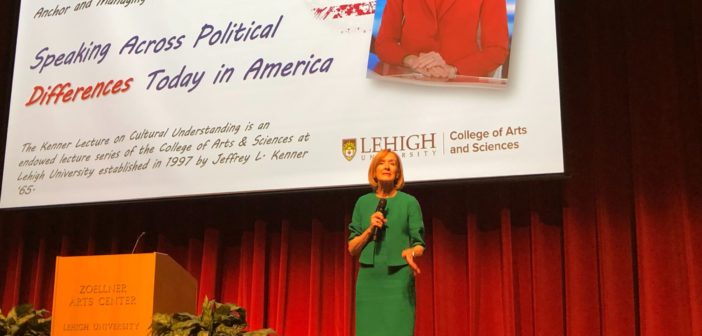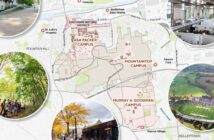Judy Woodruff, anchor and managing editor for PBS NewsHour, addressed the need for peaceful conversations, in the midst of the current polarizing state of America, at Lehigh’s 2019 Kenner Lecture on Cultural Understanding.
At the event titled “Speaking Across Political Differences Today in America,” held at Zoellner Arts Center on March 19, Woodruff traced the history of the U.S. from the civil rights movement, to the wars in Vietnam, to the recent shooting in Pittsburgh and America’s reaction to the shooting in New Zealand.
Woodruff said the country was left divided and “unsure of itself,” and though growth eventually followed conflicts, real progress and change takes time.
“Rising inequality as we enter this new millennium, along economic lines, along gender lines, along racial lines, divided the country anew and has left us — many of us — with grievances that are taking a very long time for us to work through,” Woodruff said.
Woodruff started her career covering politics in the ’70s, boasting more than 30 years at CNN, NBC and PBS. She was honored with the 2017 Walter Cronkite Award for Excellence in Journalism with the late Gwen Ifill, and they were the first women to be co-anchors of any American network broadcast. The two of them co-anchor PBS NewsHour.
Despite the struggles people encountered in the ’60s and ’70s, Woodruff said she has never witnessed the extent of polarization America is experiencing today. Issues involving immigration, the border wall, health care, government spending and budgets are only some of the causes of divisions among American people.
Woodruff said disagreements are now fueled by violence and berating language, and although the U.S. provides the freedom for criticisms and confrontations, open debates of differing views should not be hostile. She said people should be able to converse rather than take a side and refuse to listen to the opposing side.
Regardless of the topic of debate, Woodruff hopes that there is a continued effort to learn from each other and grow stronger from tough conversations instead of avoiding them.
Tyler Longo, ’20, who attended the event, said there is a political divide within his own family, which many others of his generation also experience.
“I’d like to ask how to start a dialogue with someone with an opposing opinion in the effort of reconciliation even when there’s strong demonizations of the opposing side,” Longo said.
Woodruff said listening, asking questions and talking in a casual setting can help draw people out. Although there still may be disagreements on issues, she said the important result is realizing that we are all human and deserve to be respected and loved.
Evan Chansky, ’20, who also attended the talk, said he wants to know how people should go about talking to others who are not as willing or involved.
“There is a phenomenon that I have noticed with national politics and also campus issues as well that there’s a subset of the population that isn’t as engaged in conversations. Either they’re ambivalent or apathetic or don’t feel like they want to voice their opinions,” Chansky said.
Woodruff said it is unrealistic to believe everyone will be a part of the debate, but those who want to participate should be able to in a way that allows them to understand each other and try to accept hard political views.
With technological advances of the internet and the rising presence of social media, Woodruff said democracy is causing negative effects that only increases hostility and polarization.
“We are all now connected by social media, by the internet, in ways in which we have never been connected before,” Woodruff said. “Today, there is a clear sense that some of the most vitriolic and most hateful language is grounded in religious or ethnic differences.”
The mosque attacks in New Zealand were captured on video and posted to Facebook, immediately reaching millions of people. President Donald Trump used Twitter to publicly enforce his travel ban and question the loyalty of anyone with opposing opinions. Citizens took political sides while condemning the other view, verbally labeling the adversary as “the enemy,” “unpatriotic” and “un-American.”
Woodruff said any individual can use any social media platform to spread information that can be informational and positive or misleading and threatening. Consequently, individuals are skeptical of the media and the integrity of journalists due to the appearance of fake news.
“I want to stand here and tell you, I am not an enemy of the American people,” Woodruff said. “I don’t produce fake news. Yes, I make mistakes. I’m human. My colleagues make mistakes. We’re human. But we don’t traffic in false information. That’s not what we do. That’s not what journalists do.”
Woodruff said news outlets can report their version of the truth and take a political side. She said it’s important for readers and viewers to take the time and check sources to ensure they are consuming truthful and accurate information.
With today’s tumultuous period and the upcoming election, Woodruff said every American has a responsibility to show up.
“Every one of you can make a difference,” Woodruff said. “We in the media need to do our part. We all need to do our part, and I’m betting that we are going to be engaged in this fight, if you want to call it that, to reach some kind of reconciliation — not perfection, but some kind of reconciliation where we can at least talk to each other and listen to each other because it matters so much. It matters for our younger generation. It matters for the future of our country.”






Comment policy
Comments posted to The Brown and White website are reviewed by a moderator before being approved. Incendiary speech or harassing language, including comments targeted at individuals, may be deemed unacceptable and not published. Spam and other soliciting will also be declined.
The Brown and White also reserves the right to not publish entirely anonymous comments.
1 Comment
“Woodruff said disagreements are now fueled by violence and berating language, and although the U.S. provides the freedom for criticisms and confrontations, open debates of differing views should not be hostile. She said people should be able to converse rather than take a side and refuse to listen to the opposing side.”
This and other quotes in the article show that Ms. Woodruff has a good handle on the condition of the country and actions needed for its improvement.
“Woodruff said listening, asking questions and talking in a casual setting can help draw people out. Although there still may be disagreements on issues, she said the important result is realizing that we are all human and deserve to be respected and loved.” The US needs a leader who believes this but 70 % (wag) of the people in this country who care enough to vote want a leader who will do what they want done: 46% one way, 48% another and 6% protesting/scattered.